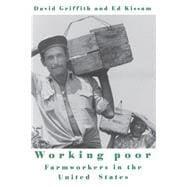
Note: Supplemental materials are not guaranteed with Rental or Used book purchases.
Purchase Benefits
What is included with this book?
| List of Tables | |
| Preface | |
| The Formation of Agricultural Labor in the United States | p. 3 |
| Waves of Ethnicity: Immokalee, Florida | p. 29 |
| Migrant Workers on the Delmarva Peninsula: Maryland Tomato and Delaware Potato and Mixed-Vegetable Farms | p. 70 |
| Domestic Farmworkers in America's Heartland: Weslaco, Texas, and the Lower Rio Grande Valley | p. 89 |
| Labor Demand in Southwestern Michigan: Last Bastion of the Family Farm | p. 123 |
| Offshore Citizens as a Supply of Farm Labor: El Mani and Sabalos, Mayaguez, Puerto Rico | p. 151 |
| A Labor Force in Transition: Farmworkers in the New Jersey Nursery Industry | p. 173 |
| Northward out of Mexico: Migration Networks and Farm Labor Supply in Parlier, California | p. 190 |
| Characteristics of the Farm Labor Market: A Comparative Summary | p. 243 |
| The Poverty of Conventional Thought: Social Theory and the Working Poor | p. 270 |
| Appendix: Methods, Sampling, and the Rationale for the Community Study Approach | p. 297 |
| Notes | p. 305 |
| References | p. 311 |
| About the Authors | p. 325 |
| Index | p. 329 |
| Table of Contents provided by Blackwell. All Rights Reserved. |
The New copy of this book will include any supplemental materials advertised. Please check the title of the book to determine if it should include any access cards, study guides, lab manuals, CDs, etc.
The Used, Rental and eBook copies of this book are not guaranteed to include any supplemental materials. Typically, only the book itself is included. This is true even if the title states it includes any access cards, study guides, lab manuals, CDs, etc.